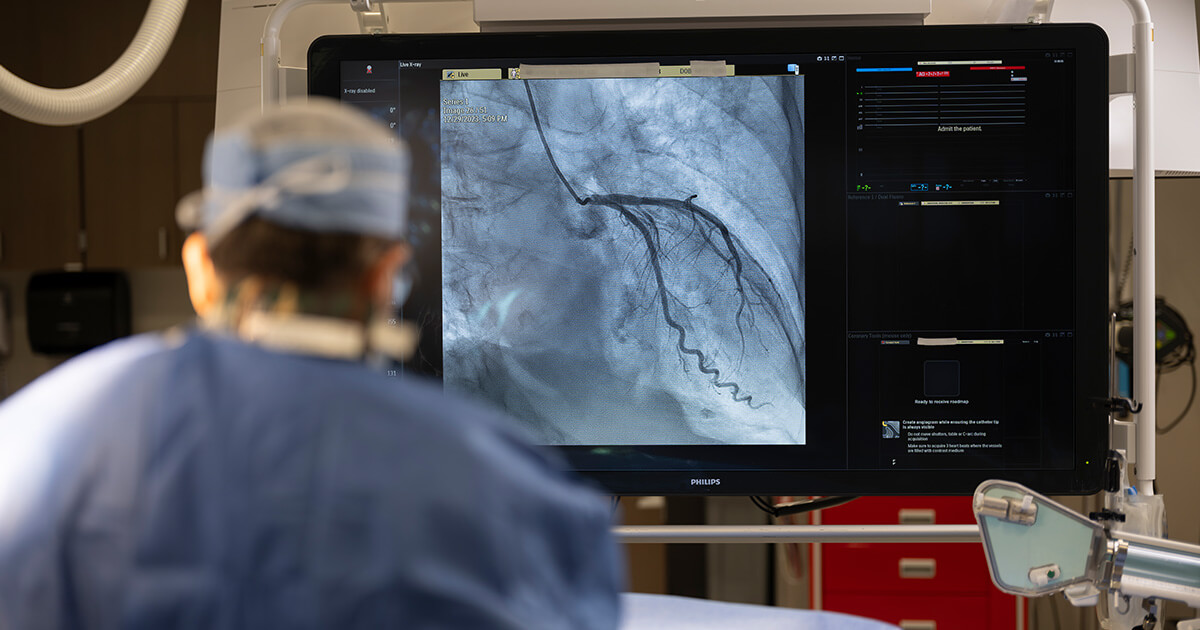
In today’s modern medicine, new minimally invasive procedures are making headway instead of the more conventional methods when it comes to treating the many forms of heart conditions and disease.
These procedures can address quality-of-life limiting symptoms caused by heart disease with fewer risks and faster recovery time. Opened in March 2022, the McLaren Greater Lansing hospital campus utilizes its state-of-the-art cardiac catheterization lab and hybrid operating rooms to provide these more common procedures, avoiding the need for invasive open-heart surgery for conditions including heart valve disease, atrial fibrillation, and heart failure.
Transcatheter Aortic Valve Replacement (TAVR)
For patients suffering from aortic stenosis, a form of heart valve disease, TAVR involves the placement of a new valve in the heart via a catheter inserted through a small incision in the leg.
“Patients are able to get back to their daily activities within a few days with very minimal restrictions,” said Dr. Majid Mughal, interventional cardiologist at McLaren Greater Lansing Cardiovascular Associates.
Recently, the McLaren Greater Lansing cardiology team performed its 200th TAVR procedure, a testament to the increased awareness of the popular procedure that has seen a tremendous impact in treating patients’ symptoms.
“More patients in their 90’s can undergo TAVR procedures,” said Dr. Mughal. “With the procedure being minimally invasive, this allows our older patients and those who have more severe conditions to be a candidate to receive the TAVR and have a better quality of life.”
Left Atrial Appendage Closure Implant (LAAC)
People living with atrial fibrillation (AFib) have a greater risk of stroke. McLaren Greater Lansing offers patients with non-valvular atrial fibrillation an alternative to longer-term blood thinning medication with the LAAC implant.
“The LAAC implant is a device that is implanted into the left atrial appendage where blood pooling can occur,” said Dr. Mughal. “This minimally invasive procedure, done through a small incision like the TAVR procedure, is a permanent implant designed to reduce the risk of stroke without the long-term need for anticoagulation medications.”
CardioMEMS for Heart Failure
The CardioMEMS HF System is utilized through the McLaren Greater Lansing Heart Failure Clinic. The system features a sensor that is implanted into the pulmonary artery (PA) during a nonsurgical procedure to directly measure PA pressure. It allows the providers to monitor and treat patients before overt symptoms occur.
Dr. Awais Kang, cardiologist, who oversees the heart failure program, said utilizing this device helps keep patients from being readmitted to the hospital while improving their symptoms.
“When patients living with these heart conditions have to come into the hospital, it exposes them to other illnesses and diseases such as pneumonia,” said Dr. Kang. “Keeping them out of the hospital and improving their symptoms can greatly enhance their quality of life.”
If you are looking for a new cardiologist and would like a second opinion, click here to view a list of McLaren Greater Lansing providers accepting new patients.
To learn more about the cutting-edge heart and vascular institute at McLaren Greater Lansing, click here.
For more articles on health and wellness, click here.